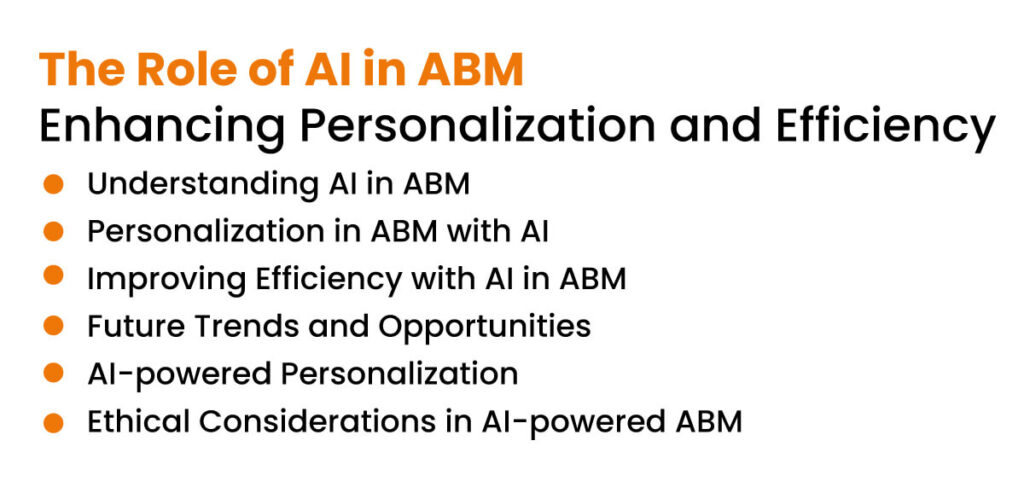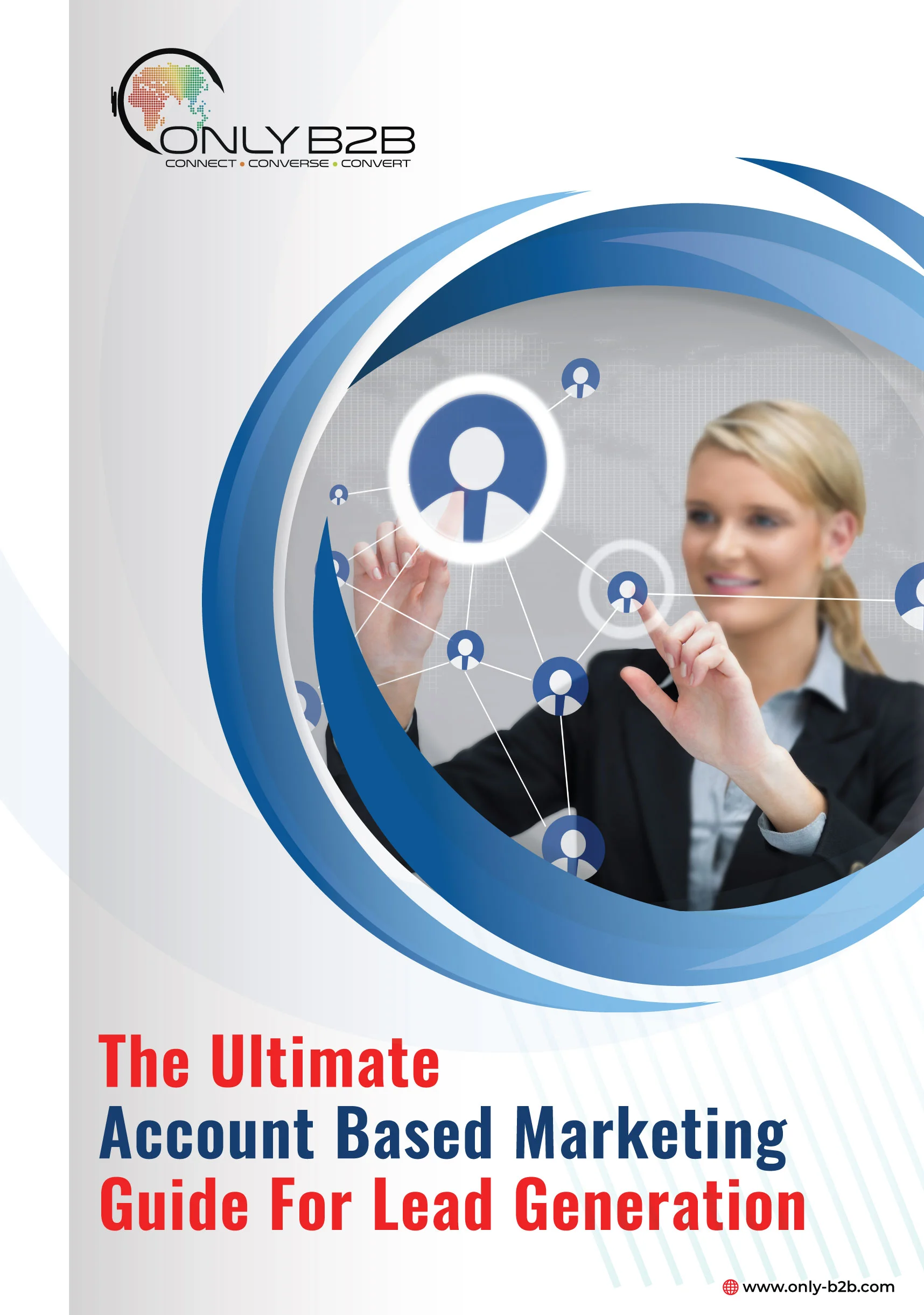
Account-Based Marketing (ABM) has emerged as a highly effective strategy for targeting and engaging key accounts in B2B marketing. With the advancement of Artificial Intelligence (AI), ABM has witnessed a transformation, enabling marketers to deliver personalized experiences at scale and improve overall efficiency. In this blog, we will explore the role of AI in ABM, focusing on how it enhances personalization and improves efficiency. Let’s dive into this exciting topic and uncover the potential of AI-powered ABM.
The Role of AI in ABM: Enhancing Personalization and Efficiency
Table of Contents

Understanding AI in ABM:
AI, the intelligence demonstrated by machines, plays a vital role in ABM. It leverages algorithms and predictive analytics to analyze vast amounts of data, identify patterns, and make data-driven decisions. According to a study by Demandbase, 80% of marketing executives believe that AI enhances the effectiveness of ABM. With AI, marketers gain valuable insights into buyer behavior, enabling them to identify high-value accounts, personalize messaging, and optimize campaigns for better results.
Must Read: Types of Account Based Marketing
Personalization in ABM with AI:
Personalization is a key component of successful ABM, and AI empowers marketers to deliver highly tailored experiences to individual accounts. According to Evergage, 98% of marketers believe that personalization improves customer relationships. AI analyzes data on buyer preferences, behavior, and intent, allowing marketers to create customized content, recommend relevant products or solutions, and deliver personalized messaging across multiple channels. This level of personalization drives engagement, builds trust, and increases conversion rates.
Must Read: Account Based Marketing Tactics in 2023
Improving Efficiency with AI in ABM:
AI-driven automation is transforming the efficiency of ABM processes. By automating repetitive tasks, AI frees up marketers’ time, allowing them to focus on strategic activities. According to a report by Roll Works, 84% of companies using AI for ABM report improved efficiency. AI automates activities such as data collection, lead scoring, and content delivery, ensuring that marketers deliver the right message to the right account at the right time. Additionally, AI-powered predictive analytics helps marketers identify accounts with the highest conversion potential, allowing them to prioritize efforts and allocate resources more effectively.
Must Read: Measuring the ROI of Your Account based marketing Strategy : Key Metrics to Track for Success
Future Trends and Opportunities:
The future of AI in ABM holds immense potential for further advancements. As AI continues to evolve, new opportunities are emerging for marketers. For example, AI-powered chatbots and virtual assistants are becoming increasingly sophisticated, providing real-time support, answering queries, and engaging with accounts throughout the buyer’s journey. Gartner predicts that by 2025, 60% of B2B companies will rely on AI to automate and enhance various aspects of their sales processes. This indicates the growing importance of AI in driving efficiency and personalization in ABM.
Must Read: The Importance of Account-Based Marketing: Past, Present, and Future
AI-powered Personalization:
The Next Frontier: AI-powered personalization is poised to become the next frontier in ABM. By leveraging AI, marketers can analyze vast amounts of customer data, including browsing behavior, purchase history, and engagement patterns, to deliver hyper-personalized experiences. According to a study by Accenture, 91% of consumers are more likely to shop with brands that provide relevant offers and recommendations. With AI, marketers can offer tailored content, product recommendations, and customized pricing, thereby enhancing the overall customer experience and driving revenue growth.
Must Read: The Most Effective Methods For Creating ABM Target Account Lists
Ethical Considerations in AI-powered ABM:
While AI brings numerous benefits to ABM, it is crucial to consider ethical implications. Marketers need to ensure that AI algorithms are unbiased, and that data privacy and security are prioritized. A study by Harvard Business Review found that 47% of organizations face challenges related to AI bias. Transparency and accountability in AI implementation are essential to maintain trust and avoid unintended consequences.
AI is revolutionizing ABM by enhancing personalization and improving efficiency. With its ability to analyze data atscale and make data-driven decisions, AI empowers marketers to deliver personalized experiences that resonate with their target accounts. By automating repetitive tasks and optimizing campaigns, AI improves efficiency and allows marketers to focus on strategic activities. As we look to the future, AI-powered personalization will continue to be a driving force in ABM, enabling marketers to deliver tailored content and experiences that drive engagement and revenue growth. However, it is important to approach AI implementation ethically, ensuring unbiased algorithms and prioritizing data privacy and security. By harnessing the power of AI in ABM, marketers can unlock new opportunities and achieve remarkable results in their B2B marketing efforts.

Vikas Bhatt is the Co-Founder of ONLY B2B, a premium B2B lead generation company that specializes in helping businesses achieve their growth objectives through targeted marketing & sales campaigns. With 10+ years of experience in the industry, Vikas has a deep understanding of the challenges faced by businesses today and has developed a unique approach to lead generation that has helped clients across a range of industries around the globe. As a thought leader in the B2B marketing community, ONLY B2B specializes in demand generation, content syndication, database services and more.


